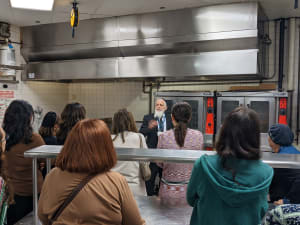Program Offers 40 Participants a Deep Dive into Kashrus at OU’s Headquarters and at Field Visit Sites
A few weeks ago, Rivki Lemmer of Brooklyn, N.Y. didn’t know that lab-grown meat existed. Now, after attending a week-long course run through the Orthodox Union (OU), she feels well-versed in the controversies and intricacies around its kashrus status.

ASK OU participants with OU Kosher Managing Director of Community Relations Rabbi Eli Eleff (left) and OU Kosher COO and Executive Rabbinic Coordinator Rabbi Moshe Elefant at the OU’s headquarters in Manhattan
“The topics covered were interesting and really touched on everything,” Rivki said. “Each seminar and field visit throughout the week was organized and well-run.”
The ASK (Advanced Seminars in Kashrus) OU kashrus experience and the ASK OU kashrus education program are offered to women and men in alternate years, respectively. This was the third cohort of women. The program offers participants an in-depth look into the laws of kosher.
This year’s program drew in 100 applicants to fill 40 spots. It primarily took place at the Orthodox Union’s headquarters in Manhattan, with educational field visits around the New York area. Participants visited a David’s Cookies factory in Fairfield, N.J., The Hilton Meadowlands Hotel’s kitchen in East Rutherford, N.J., Aisle One Supermarket in the Brook Haven mall in Passaic, N.J., and the Metropolitan Ballroom in Brooklyn, N.Y.

OU Kosher Rabbinic Field Representative Rabbi Moshe Perlmutter demonstrates how to kasher a kitchen at The Hilton Meadowlands Hotel in East Rutherford, N.J.
Seminars included topics such as “Red Flag Ingredients,” “Understanding Dairy Equipment,” “Not Your Mother’s Cuisinart: Modern Food Technology” and “Securing the Kosher Supply Chain.”
Rabbi Eli Eleff, OU Kosher managing director of community relations, oversees the program. He said, “It’s a great privilege to run ASK OU. By nature, the program attracts curious, intellectually-inclined participants who are eager to learn as much about kashrus as possible. We’re happy to provide education to klal yisroel on topics that impact their daily lives.”

ASK OU participants observe industrial mixers in action at a David’s Cookies factory in Fairfield, N.J.
Participants traveled from as near as New York and New Jersey, and as far as Maryland, Pennsylvania and Connecticut. Many of these motivated individuals took a week off from their jobs to take part in the program, which was full-time for its duration. Participants ranged in life stage and background, with a broad age range from about 18 to 75.
OU rabbis taught about concepts in kashrus such as bedikas toyalim and yoshon, as well as topics like Pesach production kosherization and understanding dairy equipment certification.
For ASK OU participant Rivka Fulda from Baltimore, M.D., the experience was eye-opening.

OU Kosher Rabbinic Coordinators Rabbi Yermia Indich and Rabbi Dov Schreier discuss food service applications at the Metropolitan Ballroom in Brooklyn, N.Y.
“I had no idea what went on behind the scenes,” she said. “Technology has transformed drastically these past few years. The industrialization of the food industry means that the world of kashrus has changed. I decided that a refresher course was in order, and I came out with a new appreciation and understanding of the kosher landscape today.”
Rena Greer of Waterbury, C.T. felt similarly.
“The work that goes into kosher certification is monumental,” she said. “People should be diligent, pay attention, and appreciate the effort that goes into being able to eat a kosher meal at your table.”
OU Kosher CEO Rabbi Menachem Genack said, “The feedback we received was unbelievable. Not only were participants amazed by the level of proficiency of our staff, but they found everything so engaging.”
OU Kosher Chief Operating Officer and Executive Rabbinic Coordinator Rabbi Moshe Elefant said, “ASK OU continues to be a trailblazer in experiential Jewish education. Participants don’t just learn about kashrus, they become a part of it.”
ASK OU has more than 1,000 alumni.

